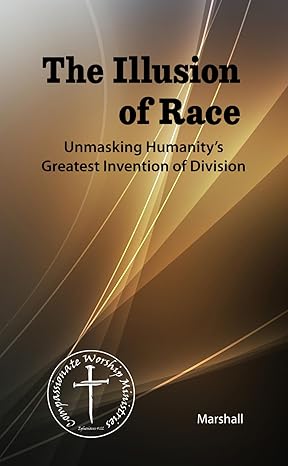The Illusion of Race: A Biblical Perspective on Human Unity
Alright, let’s get something straight: this whole idea of race? It’s a joke—a human-made joke that’s tangled us up in knots for centuries. Everywhere you look, the world is obsessed with dividing people based on skin color, culture, language, or whatever else we can find to set us apart. But here’s the kicker: God never did that. He didn’t create categories of people to keep things interesting or to set one group above another. He created people—one human family, all made in His image, and that’s what truly matters.

CLICK HERE TO PURCHASE ON AMAZON
“So God created man in His own image, in the image of God He created him; male and female He created them.” (Genesis 1:27, NASB 2020). This isn’t just a nice-sounding verse; it’s a declaration of our shared identity. Every single person, regardless of where they come from, what they look like, or what language they speak, bears the image of God. There’s no footnote saying, “Except for those guys over there.” That’s the truth, and it’s high time we start acting like we believe it.
The concept of race is our invention, not God’s. It’s a human construct built on pride, sin, and the desire to dominate and divide. It’s rooted in our flawed nature, not in divine intention. God didn’t create these divisions; we did. And since then, we’ve been stuck in a cycle of prejudice, superiority, and endless conflict. We’re so caught up in what separates us that we’ve lost sight of what unites us: we’re all God’s creation, loved by the same Savior, and desperately in need of His grace.
Remember the Tower of Babel? After the flood, humanity thought it would be a great idea to build a tower that reached the heavens. It was an act of arrogance and rebellion, and God saw right through it. So, what did He do? He confused their languages and scattered them across the earth (Genesis 11:1-9). But let’s be clear: God wasn’t creating races that day. He was humbling a prideful humanity. The different languages weren’t meant to divide us into races; they were a response to our collective ego. God’s message was simple: unity isn’t about being the same; it’s about being dependent on Him. Our languages and cultures were never intended to be weapons of division but signs of our shared humanity and need for God.
And then, there’s Jesus. Talk about tearing down walls. Jesus didn’t come for one group of people; He came for all of us. “There is neither Jew nor Greek, there is neither slave nor free, there is neither male nor female; for you are all one in Christ Jesus.” (Galatians 3:28, NASB 2020). In Christ, the labels we cling to mean nothing. Jew, Greek, black, white, rich, poor—it’s all irrelevant at the foot of the cross. Jesus didn’t shed His blood for a particular race; He shed it for humanity. For every single one of us, equally flawed and equally redeemable.
The sad truth is, the illusion of race has been used to justify some of the darkest chapters in human history—from slavery to segregation to the everyday prejudices that still poison our hearts. But the Bible doesn’t give us room to justify this nonsense. Paul lays it out in Acts 17:26, “and He made from one man every nation of mankind to live on all the face of the earth, having determined their appointed times and the boundaries of their habitation.” (NASB 2020). One man—Adam. That’s our origin, not a bunch of races, but one human race scattered across the globe, each group reflecting God’s creativity and diversity. We weren’t made to be separate species; we’re one family, and it’s high time we started acting like it.
So what does this mean for us today? It means it’s time to stop buying into the lie that race defines us. It means letting go of the labels that divide and embracing the truth that unites. Skin color, nationality, culture—these are surface-level details that pale in comparison to the deeper truth: we’re all God’s children. We’ve been bought with the same blood, redeemed by the same Savior, and invited into the same family. The illusion of race has kept us divided for too long, but grace calls us to break down those walls and remember who we truly are.
If God’s grace can cover every sin, every failure, and every division we’ve created, then it can certainly heal the wounds of racial prejudice. The answer isn’t to ignore our differences but to celebrate them as expressions of God’s creativity. Revelation 7:9 gives us a glimpse of heaven, saying, “After these things I looked, and behold, a great multitude which no one could count, from every nation and all the tribes, peoples, and languages, standing before the throne and before the Lamb, clothed in white robes, and palm branches were in their hands.” (NASB 2020). That’s the vision of unity—every nation, tribe, and tongue coming together, not erasing their identities but united in worship.
We’re not going to fix everything overnight, but we can start by seeing each other as God does. Not through the lens of race but through the lens of grace. There’s only one race that truly matters—the human race. And every person in it was made by God, for God, and is loved by God. We’re one big, messy, beautiful family, and it’s time we start living like it. So, drop the labels, embrace the truth, and let’s get back to what God intended from the beginning: unity, not division.

